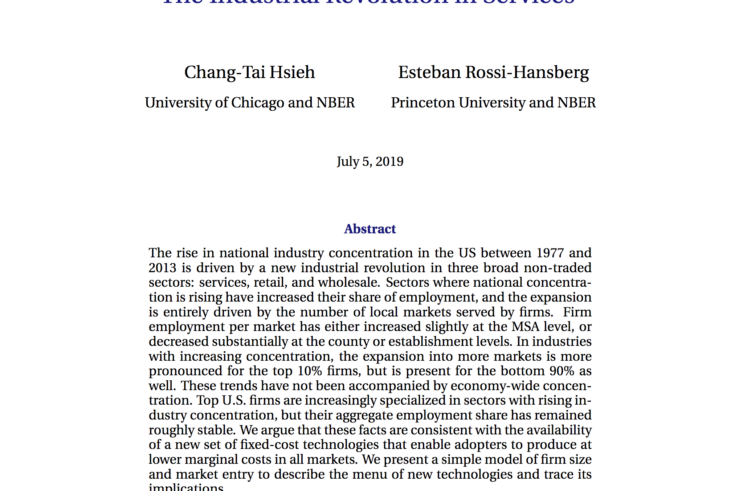Showing archive for: “Labor & Monopsony”
Institutional weakness and the fight against Covid-19 in Peru
Peru’s response to the pandemic has been one of the most radical in Latin America: Restrictions were imposed sooner, lasted longer and were among the strictest in the region. Peru went into lockdown on March 15 after only 71 cases had been reported. Along with the usual restrictions (temporary restaurant and school closures), the Peruvian ... Institutional weakness and the fight against Covid-19 in Peru
For the Bar, Competition is Always “Unethical”
State bar associations, with the backing of state judiciaries and legislatures, are typically entrusted with a largely unqualified monopoly over licensing in legal services markets. This poses an unavoidable policy tradeoff. Designating the bar as gatekeeper might protect consumers by ensuring a minimum level of service quality. Yet the gatekeeper is inherently exposed to influence ... For the Bar, Competition is Always “Unethical”
Paid to Stay Home? An Entirely Intended Consequence of the COVID-19 Stimulus
In an earlier TOTM post, we argued as the economy emerges from the COVID-19 crisis, perhaps the best policy would allow properly motivated firms and households to themselves balance the benefits, costs, and risks of transitioning to “business as usual.” Sometimes, however, well meaning government policies disrupt the balance and realign motivations. Our post contrasted ... Paid to Stay Home? An Entirely Intended Consequence of the COVID-19 Stimulus
The CARES Act and the Tantalizing Promise of a Universal Basic Income
This week, Americans began receiving cold, hard cash from the government. Meant to cushion the economic fallout of Covid-19, the CARES Act provides households with relief payments of up to $1200 per adult and $500 per child. As we have written elsewhere, direct cash transfers are the simplest, least paternalistic, and most efficient way to ... The CARES Act and the Tantalizing Promise of a Universal Basic Income
Cooperation, Competition, and COVID-19
Cooperation is the basis of productivity. The war of all against all is not a good model for any economy. Who said it—a rose-emoji Twitter Marxist, or a card-carrying member of the laissez faire Chicago School of economics? If you guessed the latter, you’d be right. Frank Easterbrook penned these words in an antitrust ... Cooperation, Competition, and COVID-19
Big Ink vs. Bigger Tech
[TOTM: The following is the fifth in a series of posts by TOTM guests and authors on the politicization of antitrust. The entire series of posts is available here.] This post is authored by Ramsi Woodcock, Assistant Professor, College of Law, and Assistant Professor, Department of Management at Gatton College of Business & Economics, University ... Big Ink vs. Bigger Tech
What if rising concentration were an indication of more competition, not less?
An oft-repeated claim of conferences, media, and left-wing think tanks is that lax antitrust enforcement has led to a substantial increase in concentration in the US economy of late, strangling the economy, harming workers, and saddling consumers with greater markups in the process. But what if rising concentration (and the current level of antitrust enforcement) ... What if rising concentration were an indication of more competition, not less?
Kochland: An Inadvertent Paean to the Glories of the Free Market
A recently published book, “Kochland – The Secret History of Koch Industries and Corporate Power in America” by Christopher Leonard, presents a gripping account of relentless innovation and the power of the entrepreneur to overcome adversity in pursuit of delivering superior goods and services to the market while also reaping impressive profits. It’s truly an ... Kochland: An Inadvertent Paean to the Glories of the Free Market
Big Tech and Antitrust
[This post is the third in an ongoing symposium on “Should We Break Up Big Tech?” that will feature analysis and opinion from various perspectives.] [This post is authored by John E. Lopatka, Robert Noll Distinguished Professor of Law, School of Law, The Pennsylvania State University] Big Tech firms stand accused of many evils, and ... Big Tech and Antitrust
Is Amazon Guilty of Predatory Pricing?
In 2014, Benedict Evans, a venture capitalist at Andreessen Horowitz, wrote “Why Amazon Has No Profits (And Why It Works),” a blog post in which he tried to explain Amazon’s business model. He began with a chart of Amazon’s revenue and net income that has now become (in)famous: Source: Benedict Evans A question inevitably followed ... Is Amazon Guilty of Predatory Pricing?
Amazon-Whole Foods symposium wrap-up
On Tuesday, August 28, 2018, Truth on the Market and the International Center for Law and Economics presented a blog symposium — Is Amazon’s Appetite Bottomless? The Whole Foods Merger After One Year — that looked at the concerns surrounding the closing of the Amazon-Whole Foods merger, and how those concerns had played out over ... Amazon-Whole Foods symposium wrap-up
Whole Foods? Seriously? Why Are We Talking About Whole Foods?
So why this deal, in this symposium, and why now? The best substantive reason I could think of is admittedly one that I personally find important. As I said, I think we should take it much more seriously as a general matter, especially in highly dynamic contexts like Silicon Valley. There has been a history of arguably pre-emptive, market-occupying vertical and conglomerate acquisitions, by big firms of smaller ones that are technologically or otherwise disruptive. The idea is that the big firms sit back and wait as some new market develops in some adjacent sector. When that new market ripens to the point of real promise, the big firm buys some significant incumbent player. The aim is not. just to facilitate its own benevolent, wholesome entry, but to set up hopefully prohibitive challenges to other de novo entrants. Love it or leave it, that theory plausibly characterizes lots and lots of acquisitions in recent decades that secured easy antitrust approval, precisely because they weren’t obviously, presently horizontal. Many people think that is true of some of Amazon’s many acquisitions, like its notoriously aggressive, near-hostile takeover of Diapers.com.







